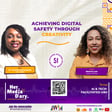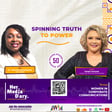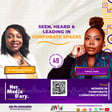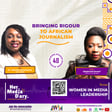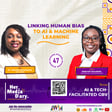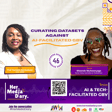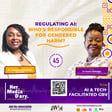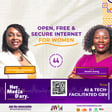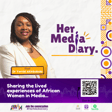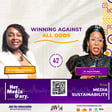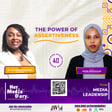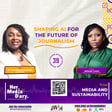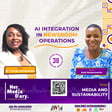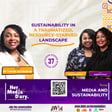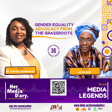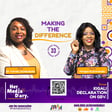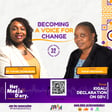Introduction to Journalism: Learning by Doing
00:00:02
Speaker
I think in many ways, journalism is a craft, right? So you can learn the basic principles and kind of a little bit of the theories that are underguarding it. But a lot of times you learn by doing.
Who is Christine Mungai? Career Highlights
00:00:24
Speaker
Hello African women in media.
00:00:27
Speaker
Joining me today is Christine Mungay, a Kenyan writer and journalist based in Nairobi. Her journalism career began in 2010 at the East African newspaper, where she reported on politics, security, business, culture, and the arts. In 2014, she moved to male and guardian Africa, where she made a shift to data, period reporting. And today she's an editor and curator of the Elephant and online publication in Kenya.
00:00:56
Speaker
and a freelance writer. Her work has been published in the Washington Post, the Boston Global, CNN, Al Jazeera naming reports, and Popular magazine. In 2015, she was the first runner-up for the David Astor Journalism Award, a professional development prize for these African print journalists. And she was a Bloomberg Africa Media Fellow in 2016. And most recently, a 2018 Newman Fellow at
00:01:26
Speaker
Harvard University. These are commendable achievements, Christine. Did I do a good job of introducing you? Absolutely, you did. Thank you. I feel so accomplished.
How did Christine Mungai start her journalism career?
00:01:41
Speaker
So now I get a lot of questions about how to get started in the journalism industry. You know, people asking how did it break in? How did they get that leg, that foot in the door?
00:01:53
Speaker
So perhaps through your journey, we can get a glimpse into how you did it, how you managed to break through. So do you want to start us off by talking us through the first steps in your journalism journey? OK. So growing up, I never really had a dream to be a journalist or a writer. I was just really intellectually curious. And I was reading all kinds of things all the time from novels, newspapers,
00:02:22
Speaker
Basically anything I could get my hands on. But during my undergraduate years in university, I studied biomedical science. But I was also kind of starting to write poetry and short stories on the side. Not really for publication, just for myself. You know, when you're in your teenager, sometimes you go through like a very kind of angsty situation, yeah?
From Biomedical Science to Writing: Christine's Journey
00:02:44
Speaker
So that was kind of my way of coping through that time. And a newspaper here in Kenya, it's the leading newspaper, it's called Daily Nation. They had a Friday section where they would publish short stories. So I just sent in my fiction short story and I kind of forgot about it. And then some months later I saw it in print.
00:03:05
Speaker
I think I was 18 at the time. I mean, it was such a delight to see that someone had actually read it and considered it for publication and actually put it in print.
00:03:17
Speaker
And that moment kind of stayed with me for the next few years. And then as I was studying my science degree, I kind of started being dissatisfied with what I was learning, not really with the material, but with the kinds of questions that it was asking of me. There was a lot of kind of memorization of facts and
00:03:38
Speaker
wrote learning and for me at this point I was always trying to kind of understand the why, why things happen the way they do and I wasn't really getting broader answers outside of this kind of canon of scientific facts, right? So I started kind of toying with the idea of exploring this part of my personality or of my talents, yeah?
00:04:03
Speaker
Then when I was in my third year in university, there was a writers workshop that was advertised just for people who want to kind of start out in writing. It was an organization here called Kwani that was doing a lot of phenomenal things in the literature and
00:04:21
Speaker
Kind of non-fiction and non-fiction space. So I went for this workshop and I got to meet some of the writers that I had been following whose work I had been reading. And we just did a simple kind of introduction to creative writing seminar.
00:04:36
Speaker
And I was really, really inspired just by seeing these people in the flesh and learning under them for a week.
Christine's Accidental Entry into Journalism
00:04:43
Speaker
So then I went back to university and I just made the decision that I would finish my degree, but that I wouldn't look for work in the medical labs. I wanted to see what I could do with this dream that I had.
00:04:57
Speaker
So after I graduated, I got a job with a TV show that was looking for writers for the show. It was a trivia game show for university students. I had played the show and then our team won. So the producer remembered me and she was hiring people to write questions and that's how I got into the writing team. So we would kind of be on Google and Wikipedia and do research and we would
00:05:22
Speaker
write questions for the show and after a season or two seasons the show wrapped up but one of my colleagues was friends with the managing editor of the East African newspaper and when the show wrapped up this guy who was the editor of the newspaper called me and he said so what are you up to now that your show has wrapped up and really I didn't have any plans I was like I don't know I'm open for whatever
00:05:46
Speaker
So he asked me to come in and we talk and he asked, have you ever considered being a journalist? And I said, you know, not really, not really like a news kind of journalist, but I mean, I'm open to learning. And right then that he gave me an opportunity on the spot. And that's how, that's how I started out in the newsroom. It was almost kind of semi accidental because we've already had some kind of interest at the beginning, some experiences.
00:06:16
Speaker
I know it's more around networks and fields. Exactly, exactly. It was through a chain of people that I knew. So there wasn't anything directly. I didn't apply for a job or anything like that. Going back a little bit, you said that you were studying biomedical sciences.
00:06:33
Speaker
Why were you studying biomedical sciences? How did you find yourself there? Growing up, I was always a really good student. I had really top grades all through my schooling life. And in our cultural context, when you have grades like that, you're kind of just steered into one of three careers. So being a doctor or a lawyer or an engineer.
00:06:57
Speaker
I wasn't interested in engineering or being a lawyer. And when I applied to med school, there was a kind of a reshuffling of the point system. So I missed out on the medical degree, but I got into biomedical science, which is more of like a research oriented kind of career. So I was I was pretty happy, you know, but I wasn't really like
00:07:21
Speaker
dreaming to do biomedical science. It was just one of those things that you're kind of shepherded to because of kind of your potential and what people expect out of you in life. Yeah. It's interesting that a little of the afternoon I speak with talk about this initial start in the education being around where you're pushed towards and generally around, you know, you have a doctor or an engineer or a lawyer. Yeah.
00:07:51
Speaker
But that's a common thread. Yeah, it's fairly common, I think. It's not even a Kenyan thing. I think it's just maybe you could say our African parents are like that. I don't blame them. I guess they want the best and they want their kids to be kind of financially secure.
Navigating Cultural Expectations in Career Choices
00:08:10
Speaker
And that's why they and also kind of the family status of having a doctor in the family or a lawyer or whatever.
00:08:18
Speaker
So we didn't grow up really with a sense of like you could be anything that you wanted to be. It was very clear you could, there were only like a couple of kind of like proper respectable things and then the rest of it you are kind of squeezing your way through it, you know. So now going back to
00:08:36
Speaker
building networks and that first opportunity that you got after your show wrapped up.
Using Science Background in Journalism
00:08:41
Speaker
It was really kind of serendipitous that it happened like that. So the managing editor of the East Africans asked me to send a writing sample and I did and he liked my writing style. It was just a very simple book review, right? And he said that
00:08:57
Speaker
yeah he could use someone like me in the newsroom i had you know potential i could be shaped you know i could grow in it and and that's how i started because of my science background i started off as a science reporter so what i would do is um kind of be on the science speed but also when major research findings are announced just translate that into layman's language without missing like the
00:09:24
Speaker
the context and the nuances of the research. And that's how I started writing mostly like on the science and research pages, but pretty soon I broadened into writing a whole bunch of other stuff. I tried to have a specific beat, but it never really worked. And to this day, I can't really tell you I specialize in a particular beat. Yeah, I was going to ask you about that. Because you're done with science-focused research, science research-focused degree,
00:09:58
Speaker
do you think that's true? Do you think it's useful for people to kind of have expertise in other areas outside of journalism or do you think that having that journalism training is
00:10:10
Speaker
better than maybe having an external role that can apply to journalism. You know, I'll kind of speak from my personal experience and also from what I've experienced with my colleagues in the newsroom. It really, really helps for you to have just a different degree from journalism because
00:10:29
Speaker
I think in many ways, journalism is a craft, right? So you can learn the basic principles and kind of a little bit of the theories that are underguarding it, but a lot of times you learn by doing, yeah? But when you have a training or an interest in another discipline,
Christine's Approach to Storytelling and Investigation
00:10:50
Speaker
It really makes your journalism stand out and have a different character. So in my experience, because I had a science and research-oriented degree, and also because of how I had grown up, I mean, I was a really voracious reader. I would read everything from comics to novels. I would even read the phone book, right? I used to read everything. I could get my hands up.
00:11:13
Speaker
And because of that, when I got into the newsroom, what made me stand out is that I used to read research reports. So donors and health organizations and, you know, monitoring and all this, you know, they would put out like maybe an annual report on something. So, for example, the world malaria report comes out once a year in December, they would be like these HIV reports and they're pretty thick and dense, right?
00:11:38
Speaker
Even the World Economic Forum and the World Bank, the World Bank publishes a whole bunch of reports every single month. So people in the newsroom would find it difficult and boring to kind of plow through all these pages. But because I was a super fast reader and also my research did kind of change me in a way of looking for connections between things.
00:12:03
Speaker
So I would be the person who would report from reports. So I would read the really dense stuff and try to extract the interesting trends in there and just make it light and accessible reading and say why this matters and what's interesting about it. And a few people in the newsroom could do that. And so I kind of had a niche and I had space to grow and I also had space to
00:12:29
Speaker
to develop my skill and my craft and to think. And I didn't get that from journalism training. I got it from being immersed in a different kind of space. So then you went on to then write across a range of topic areas, politics, culture, business, the arts. So now having done that, do you feel there's benefits to having a piece? Like you said, you found that difficult.
00:12:54
Speaker
Yeah, I still struggle with that. I still struggle with kind of restricting my mind to focusing on one thing. Right now what I've been doing in the past maybe you could say for so years is I've been trying to for my work to quite explicitly like make connections between things that kind of seem unrelated but try and extract meaning from
00:13:21
Speaker
It was an example of that. In 2014 or 2015, I traveled to Abuja for the second time. I had been there years before, but this one I spent a couple of days there. And one of the things I noticed about Abuja is that when we're driving on the highways, I mean, it's a city with really wide highways, wide roads. And on the side of the roads, there were so many half-finished buildings.
00:13:49
Speaker
So on the surface, it appears that there was a construction boom. But then when you look closer, you realize that this house hasn't been touched in a while, months or even years. So I wondered, what's going on here? How can a city of this size and prominence, because it's the capital, how could it have so many unfinished buildings? So as a good journalist, I talked to some people on the ground. The best people to talk to are always taxi drivers.
00:14:18
Speaker
And they had a bunch of theories, right? But one of the things that they said was that a lot of times people kind of use real estate and property as a way to park money, as they would say. You have a bunch of money that
00:14:36
Speaker
you can't really take to the bank. And so you sink it in property, right? But you're not really invested in developing it for any purpose. It's just a way to kind of place your money there until further notice. And so right there, there was a connection between what is happening in the construction and real estate sector, but also what's happening kind of in the
00:14:59
Speaker
banking sector and in economies in the economic sector and also what that has to do with how vibrant cities look or you know the kind of the kind of meaning that you would get from just looking at a city on on the surface level right so i talked to my editor about this and he proposed that we
00:15:21
Speaker
We kind of create this was kind of tongue in cheek, right? So we propose an abandoned buildings index, which measures the rate of construction versus the length of
00:15:35
Speaker
time a building remains idle which kind of gives you a hint of these trends that we're talking about what does that have to do with corruption for example with how effective money laundering laws are and so it was a kind of a symmetrical way of looking at
00:15:53
Speaker
what people would see on the surface and kind of make a quick conclusion about it. But we went at it in an opposite way and extracted a different kind of narrative from those set of facts. And for me, that kind of journalism is really rewarding where I can be imaginative with my work and with my conclusions. Yeah. So you pride yourself in your skills you have in terms of long-term journalism.
00:16:21
Speaker
First of all, what is long-form journalism? I think that's just a term that people in the industry, in the writing and publishing industry use to describe long essays, I could say. That kind of trend and describe some a trend or explain a trend because of the way the internet age came and kind of had this frame of short attention spans. I think in the past maybe decade,
00:16:51
Speaker
or so a decade and a half like new stories online tended to like be really short right so that they can be quickly shared and quickly disseminated because of that assumption that people don't have a lot of time and attention to spend on a story but really that created
00:17:11
Speaker
a demand for the very opposite, for kind of longer, most thoughtful pieces that uncover trends and unexpected connections. And that's the kind of work that I hope my writing does. It's something I grew into. I wasn't, I didn't, I haven't always done this in my writing. I definitely did have a season when I was learning the ropes.
00:17:34
Speaker
and I did the news beats and I did those short stories, I did the briefs, I did the press conferences and for me it was really rewarding to be in that space and to kind of understand how it works. I wanted to go back to that story in Abuja because that sounds really interesting. You've talked about taxi drivers as a big source for information for environments that people are new in.
00:17:59
Speaker
and then how to develop. So I'm really interested in unpacking your journey in that particular story.
Investigating Abuja's Unfinished Buildings
00:18:08
Speaker
So could we start from the point of which you started asking those questions from the drivers to what the actual eventual outlook was of that? Just kind of unpacking that journey a little bit more for those who are interested in kind of this kind of bezel of investigative long-form journalism.
00:18:27
Speaker
Yeah, that particular story wasn't a long-form story. It ended up being a data story that was kind of more of an infographic kind of delivery. That was the time when I was doing a lot of data journalism. I did that for some years. Now I'm more in the essay space, but at that time I can share what
00:18:51
Speaker
what we did at that time. So while we are driving in Abuja, like by the time I was getting to Nigeria, if you're on a reporting trip, by the time you're landing, your senses are already so heightened. Like you just want to observe everything, to hear everything because you're depending on your senses to tell you where the story is. So just as we're driving, I noticed like building after building after and these were not small buildings. They were like
00:19:20
Speaker
four to eight storey buildings which you know grass is growing from the roof right grass is growing from the half finished roof and walls and it was it kind of struck me as this is very unusual if it happens again and again and again right and so that evening i went to the hotel room and
00:19:40
Speaker
I googled abandoned buildings in Abuja and I came across this government report. FCT, the Federal Capital Territory Administration had actually counted the number of abandoned buildings in Abuja because they were saying that this is a problem. And so they had done an audit and it came to, I don't remember if it was 400 or 600 buildings in the city, right?
00:20:02
Speaker
That kind of confirmed what I had seen with my own eyes that people had actually done some on the ground work and I had a number now, right? And so the next day as we are driving around, I mentioned it to the person I was with who was a taxi driver at the time, and then we had a conversation. And then finally, after thinking about it for some time and also in consultation with my editor,
00:20:29
Speaker
And then we kind of came to a conclusion of how to be the story which was.
00:20:35
Speaker
which was fun to do. Infographics are always fun. It was a light way to present something that you couldn't quite definitively say that this is the reason why there were abandoned buildings in Abuja, but you could propose a number of possible reasons. And so we were tentative with our conclusions, but I was excited to
00:21:02
Speaker
That's what made me excited and so this story had all those pieces. It had my own observations and then it had some research and data supporting what I had seen and then it had some conversations from
00:21:19
Speaker
and insights with people who live there because people who live there know what's going on more than someone who just flies it right and then I also had input from another set of eyes and it really helps to have
00:21:34
Speaker
someone who can help you think through stories and also see something that you're not seeing and being in that environment where you can collaborate really helps to put things together and so there's no one day that I can say I have a prescriptive way of doing stories but it really just depends on
00:21:54
Speaker
on what I'm working on, but I think most of my stories have elements of all these things. They have elements of what I've seen and heard. They have elements of what I've read. They have elements of what I've talked to people about. And also, finally, what ties them all together is kind of my analytical voice now.
00:22:14
Speaker
that I try and join the dots, put the pieces together so that it's not just a set of observations, but also that it has some meaning that you can extract from it.
How has Christine's Literary Voice Evolved?
00:22:26
Speaker
And you spoke earlier on about your literary voice. How do you find that literary voice?
00:22:33
Speaker
I think it's a lifelong journey. I wouldn't say that I've found it. I would definitely say that if I read my pieces from four or so years back, I can see growth, that I'm not imitating the writers that I admired as much as I used to. I feel like I've now been able to just start developing my own style.
00:22:57
Speaker
But this thing comes with time and with practice, right? You can't sit down one day and say, from today I'm developing my voice. You know, it doesn't work like that. It's not something that you can make. This is my goal for 2019. It's not a goal that you can put it down like that and take it off by the end of the year. Now I have a voice, you know? It's something really subjective. It's subtle.
00:23:21
Speaker
It's not easy to pin down. It's not even easy to describe. But it happens slowly. And like I said, I can't really tell you how I've come to it. But if I read my past pieces, I can tell that they have a different tone and approach.
00:23:39
Speaker
And now my pieces kind of sound different. I own them more than I used to. Like the paragraphs now that where I am speaking in my own voice are much more solid than they used to be in the past. When you say solid, you mean confidence? When I say solid, I mean that when I'm doing the analysis of the piece, yeah?
00:24:05
Speaker
Where it's, I'm not reporting anymore. Now I'm telling you what I think it all means.
00:24:11
Speaker
I think my confidence has been growing because now I can say this is what I think it means. And before I, a lot of my pieces never used to get there. They never used to get to that point of putting it all together. It was just like I'm describing something. And really there's a lot of room for descriptive journalism. Don't get me wrong. That's some of the kind of work that can be really, really delightful to read.
00:24:39
Speaker
But what I'm saying is that with time and with practice and with you being confident in your space and also just growing in your own interest. There are things that I'm interested in, there are things that I'm not. And there are things that I'm passionate about and there are things that I'm not. So when I kind of got a little bit settled into
00:25:05
Speaker
just being having the room to say that this is what I want to write about. It's not that I've been sent an assignment for this, but it's because this is what I want to do. Then that's how your voice starts developing. When you're doing it really out of your own volition, your own convictions, you're not on anyone's deadline as such, you know. So I want to move on to your freelance experience
Publishing Internationally: The Role of Networking
00:25:28
Speaker
now. So you've published in Washington Post, Boston, GoBond, many of the kind of international media organizations.
00:25:34
Speaker
Tell us about that journey into that space. And for those who are aspiring to get there, what would be the kind of journey they should expect on the guidance towards that? Yeah, so that has happened fairly recently, I would say over the past year.
00:25:52
Speaker
the past one year at most. This is excluding Mail and Guardian Africa, which was publishing out of South Africa, but we were employees of that company, so I wasn't freelancing there. In the past year, in 2017, I got an amazing opportunity to be a Nieman Fellow at Harvard. The Nieman Foundation for Journalism is an institution at Harvard that provides a space for journalists to come in
00:26:18
Speaker
and think and reflect and collaborate and network and meet each other. It was a wonderful year. I spent a year there at Harvard and I met amazing, incredible people. Our group had 12 American journalists and 12 international ones. And we were meeting twice or thrice a week for various things. So I had a chance to recreate
00:26:43
Speaker
deep relationships with my class, with the rest of the fellows. And so many of these pieces were basically just some of my fellows introducing me to an editor at the post, an editor at the Boston Globe and saying from a conversation that I had with them, they say, I think Christine has something
00:27:02
Speaker
that your readers should hear. And that's how these conversations begin. I also have a network of writers here in Nairobi. And they have also been incredibly instrumental in opening some of these doors for me that someone could be thinking of an idea, we kind of chat about it lightly on Twitter, and then they quickly DM it and they're like, I like what you said in your thread, do you want me to introduce you to such and such an editor, you just put it in an article.
00:27:32
Speaker
And yeah, and so I've been really fortunate to be in a community of like-minded people and also people who believe in me, right? That sometimes it's really easy to be discouraged, right? And to think that you have to move the mountain yourself. But there are people who have the keys to the mountain and a lot of times it's not that I'm knocking down doors, it's just that I'm in a space where
00:28:00
Speaker
I kind of feel safe and I feel inspired and energized and someone who thinks, who kind of has a way to make this have a bigger audience. They're like, do you want to try and rank this into an article? And I'm like, yeah, I'm open for that. And so this is how this has happened. Just that, that really.
00:28:20
Speaker
creative community both here in Nairobi and also as part of my fellowship here.
What is Christine's Advice for Seizing Opportunities?
00:28:26
Speaker
I mean those were incredible stepping stones. 18 months ago I was at where I am right now.
00:28:32
Speaker
But I mean, it didn't happen randomly, right? You've been building up for that moment where you were kind of ready. And then you got these opportunities. Exactly. For sure. Like the only way to be ready for an opportunity is to keep being ready. I don't know if that makes sense. Like to be ready all the time to grab it. Yeah. And so I don't think I was ready for this two, three years ago.
00:28:57
Speaker
But when it came together, then I had been practicing, right? I had been practicing when I applied for the fellowship. I mean, I just applied for it, right? They asked for a bunch of things. I sent it to them. Then I waited to hear back. And they called back and they're like, do you want to join us in the fellowship? I mean, you have it.
00:29:19
Speaker
And for me, I was I think to myself, if I didn't apply for it, right, if I didn't think that I could get it or if I didn't even want to take a chance, then I wouldn't have been where I am today. Right. So some of this is is preparation. Some of it is is courage to kind of put yourself out there. Some of it is consistency. And people really people really see and appreciate when you're consistent in something.
00:29:48
Speaker
know, a lot of people also need to consider that these spaces are the spaces where they were found by editors and commissioning editors. So they shouldn't just be saying things that would limit their opportunities. Oh, for sure. For me, I have definitely got
00:30:06
Speaker
a number of opportunities from thinking aloud. And sometimes it's not even as direct as that. It's not that someone necessarily approaches you and says, do you want to write for me? It's more of in an indirect way. That's someone who knows that person.
00:30:24
Speaker
sees it and then asks you if you would be interested in an introduction, right? Sometimes it's not when you're not so self-conscious about it and also when you're using the space to really just bounce your ideas off like-minded people and see how it lands. A lot of writers use Twitter to test ideas. We're going to talk about picturing first, the news organisations. Then we're going to talk about applying for fellowships and the skills you've gained through that.
00:30:54
Speaker
Let's look at pitching first. So when you've kind of developed an idea and talked about it a little bit and you're now pitching to an organization, what's the core skill you think and what's the best practices in that process of pitching to an organization like CNN and Boston Globe, for example?
00:31:13
Speaker
The thing I love about Twitter is that it trains you to discipline your mind to express thoughts in few words. And that's, that's a really important skill when you're preaching, right? The ability to be pithy, right? But for your words to be packed in meaning, right? And for me, Twitter has helped me discipline my mind in that way, that
00:31:39
Speaker
I now know how not to give up words, and I know how to pack a punch in just a paragraph. And that's really, really essential to good pitching. And the second thing is to know the audience of the publication that you're pitching to, to be able to explain why those readers would want to read what you're writing. The fact that it's interesting to you doesn't mean that it's interesting to them.
00:32:04
Speaker
Yeah. And so mostly is getting the editor invested in the story as much as you are. And the way to do it is, is to show how this will resonate with their readers, because the editor doesn't care that much about your talent and your skill. I think they look much more to serving their audience than serving you the freelancer. Right. Yeah.
00:32:30
Speaker
Yeah, so you have to wrap your idea in the wrapping paper of the editor's interests. And that's how they write back to you because they're invested in the story as much as you are. So you invested in it because it's your idea, you think it's amazing. But for them, they may think it's amazing, but they would be more interested in like, why would this matter to our publication, right?
00:32:57
Speaker
How do you write that winning pitch? I think it's super important for you to be able to be in, not just in your own mind, in your own talent and your own brilliance, but to be in the mind of the editors and of the audience that you're looking at. What do they care about? What are they wrestling with? What would they be delighted to discover?
00:33:23
Speaker
And when you put it that way, then you can have a conversation with the editor. It's not just about how amazing the idea is. It's about how it fits in that schema, in that world of things, right? In that world of interests and ideas and concerns and problems. How does your idea fit into that? And so I wouldn't say that there's a formula of writing a winning pitch.
00:33:48
Speaker
It just helps to be pretty, to be short, to be... I usually try for my pictures to be a bit more hyperbolic than the article will be, you get? So that it draws their attention, right?
Future Goals and Facing Industry Challenges
00:34:08
Speaker
And then from there you can develop the idea in a way that is fit for publication from there, right? So you've written for...
00:34:18
Speaker
international publications we've talked about kind of writing pictures and you've talked about the benefits of understanding the readers of that publication because after all that's who the editor is trying to serve and so by understanding the readers and the kind of content that serve those readers and pitching related content you have a higher chance of being commissioned. So now moving on to using that same kind of ideology within
00:34:43
Speaker
pitching or writing or applying for fellowships. What's your advice in that area? The guidelines for writing a fellowship application are also applied to pitching, right? So, fellowships a lot of times, I mean, they're there
00:35:01
Speaker
And people want to give the fellowship, right? So you need to tell them why they should give it to you and why they would benefit from giving it to you and not to anyone else, right? And that can be by two ways, by playing up your strengths. But mostly, I think this is someone that someone advised me and I was really pleased that they said this to me.
00:35:27
Speaker
They said you should be able to demonstrate what you would bring to the group if you got the fellowship or what the fellowship would be useful for. Not just to you, but to the other people, to that organization, to the fellowship group, to the cohort. So that it's not just a selfish, individualistic thing. You demonstrate that you're also there to give, you know, to give and to learn, not just to take.
00:35:55
Speaker
Yeah, I think, I think what you said right there about thinking about what you bring to the table is just as important on how you thinking the fellowship could help you. And it's an area that I suppose we always miss out when we're applying for things is asking ourselves, how can I contribute to this organization? How can I contribute to this job beyond just thinking about how is this job or opportunity going to grow me? So I think that's a really good valuable advice given there.
00:36:23
Speaker
Where next for you then? So you've had tremendous successes in the last few, last couple of years, what 2019 and subsequent years bring in for you? I want to write more. I want to write more. I have so many, I have so many stories that I don't think I've told yet or told conclusively.
00:36:45
Speaker
Yeah, so I want to write more. I want to be more consistent. I want to go deeper. I feel like I'm really just scratching the surface. As much as I've done a bunch of stuff in the past couple of years, I feel like now this is when it's really beginning. This writing thing, this journalism thing. I feel like I'm just scratching the surface of it.
00:37:09
Speaker
And so I have a bunch of ideas in my mind. I have a possible book idea. Yeah. And so I'm really looking to to expand my, my audience, to expand the scope of the work that I do and to really now get into the meat of it. Because like I said, as much as I've done a bunch of stuff, I feel like it has been, it has been warm up. You know, I'm ready to sprint now. I want to go. Yeah. Yeah.
00:37:38
Speaker
Yeah, it's like you said, you know, you've been working towards this for your career life and it's now that you have the opportunity.
00:37:48
Speaker
kind of that saying of you need to you know um um run to the to the profit but you know run to the funding and then spread exactly exactly that's definitely what i'm looking to do i want to write that's what i want to do with my life and i feel like i i'm starting to be in that space where i can do a lot and and i pray that i i have the
00:38:12
Speaker
the focus, the resources, the mental stamina, the ideas, you know, the everything so that I can make it happen because really this is something that brings me joy. It's not just a job, it's something that story ideas keep me up at night. That's how I know that this is my thing. So you've been a female journalist in a space that you've worked in. What has been your experiences and, you know, how did you overcome those?
00:38:41
Speaker
I guess I would have one positive and two not so positive things to say. So let's start with the good stuff. Like I said earlier, I feel like I've been really extremely fortunate to have an amazing, amazing group of
00:38:58
Speaker
mentors and editors that I've worked with through the years. People who saw something in me and invested in me and pushed me and challenged me to be better and to do more and to aspire more. And that is something that not all writers have. A lot of people drop out or leave the newsroom or even leave writing because of that discouragement. No one was there to encourage them. No one was there to believe in them. And so
00:39:27
Speaker
I'm really truly grateful to the editors that have been there for me all these years. But the two things I would say that have really been difficult to deal with, first of all is just the sexual harassment in newsrooms and in these kind of spaces.
00:39:46
Speaker
The sexual jokes the innuendo the harassment the rumors like it can have the potential to really bring you down and for me I've I've been a victim of it. I've been in the center of such things and I mean to keep your mind straight and clear and to stay in the game and to stay inspired and to keep Loving what you do is difficult when this is happening to you and happening around you and so I think I think
00:40:15
Speaker
It's time for us to have a proper conversation among people in our field about this because as the MeToo movement was saying, I think it times up for this kind of stuff that's happening. And secondly, this is a small annoyance, but I get it a lot in media. It's what some of us call mansplaining.
00:40:39
Speaker
like when you yeah when you make a point and then yeah and then a man like restates the point and then sometimes he starts by saying okay what she's trying to say is such and such and you're like yeah but i just said that i wasn't trying to say it i said it you know
00:41:02
Speaker
So, for me that really annoys me. I mean, it's a small thing, but it's annoying because it kind of creates the assumption, right? That ideas are the preserve of certain people. That we're going to judge the idea by who it's coming from instead of what the idea is, right? That's what one's explaining is it's like the idea is not valid if it's not coming from such and such a person, right?
00:41:27
Speaker
That used to happen to me so much like earlier in my career. These days I've learned how to push back a bit and so I don't let it slide anywhere. What are some of those techniques you've been using to push back? Yeah, when someone says what she's trying to say, I stopped them. I said, I'm not trying to say it. I just said it.
00:41:51
Speaker
It throws people off, but then they become more careful about misappropriating your ideas. I think that's the thing, it's like standing up and just saying, no, it's not acceptable. And while I don't suggest that Leona should be on us to stand up for ourselves, I think making people aware that that is inappropriate and not reword what you said.
00:42:17
Speaker
when I just said exactly what you were saying for me. So I think definitely kind of voicing and making ourselves heard to say it's not acceptable. It's definitely a good step in the right direction.
00:42:33
Speaker
All right, really? Yeah, and after some time people learn to respect your contribution to the group, right? That it came from you, like it doesn't have to come from them for it to be valued, yeah? Brilliant, so do you have anything else you'd like to add that I'm going to ask you today?
00:42:54
Speaker
The final thing I would want to say is that for me writing has always been, I've always thought of it as not just a job but as part of my life.
00:43:06
Speaker
And so I don't believe in like work-life balance. I just, I think that's a false dichotomy. I just believe in just life, right? And work, the writing part just has to fit in life. And so I think it really helps for you to have a support system. Let me put it that way. A support system in your life.
00:43:30
Speaker
that gives you the time to breathe and to think and to explore. Family helps having having a great support system really helps you to to grow and and stretch yourself and be excellent in this space. Yeah. Yeah, I think that's really I mean, it's really it's really a good way to end this because a lot of women in particular have to deal with certain aspects of their life and stages in life in
00:43:59
Speaker
in part and parcel with the stage of your career. So in the last couple of years, I've had two children, you know, and those breaks in career, you know,
00:44:13
Speaker
It has a big impact. There's a project I started in 2014 at the UK to work on and it's only now that I'm really able to pick it back up and start it up again. People are wondering, why is it taking you so long? Because I've had two children in that time. It's really important to be kind to yourself, right?
00:44:38
Speaker
Yeah, to treat yourself kindly and gently. And to say that I'm not going to guilt trip myself or feel like I'm wasting years or that kind of thing. But just be gentle with myself. I have two kids of my own. They're six and five. And when I went to the US for a year, I went with them.
00:45:02
Speaker
they were really like you know they went to school there and the other fellows also had kids so the kids had their own kind of play groups and they had their kids fellowship you can call it yeah and i think my kids left there knowing that this is what mom does and and we are a part of it you know
00:45:24
Speaker
I hope that they will remember the year that we spent there. I'm pretty sure they would. But I think it was important for me to do that so that I also learn how to follow my passion and live with them. You know what I'm saying? So that it's one thing that we're doing. They're not in tension with each other. But we're just trying to live one life. Brilliant. It's been amazing speaking to you, Christine.

